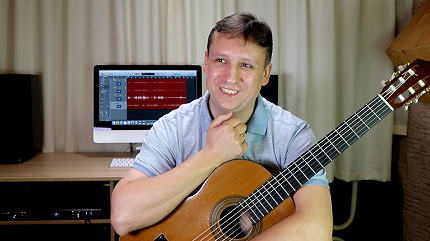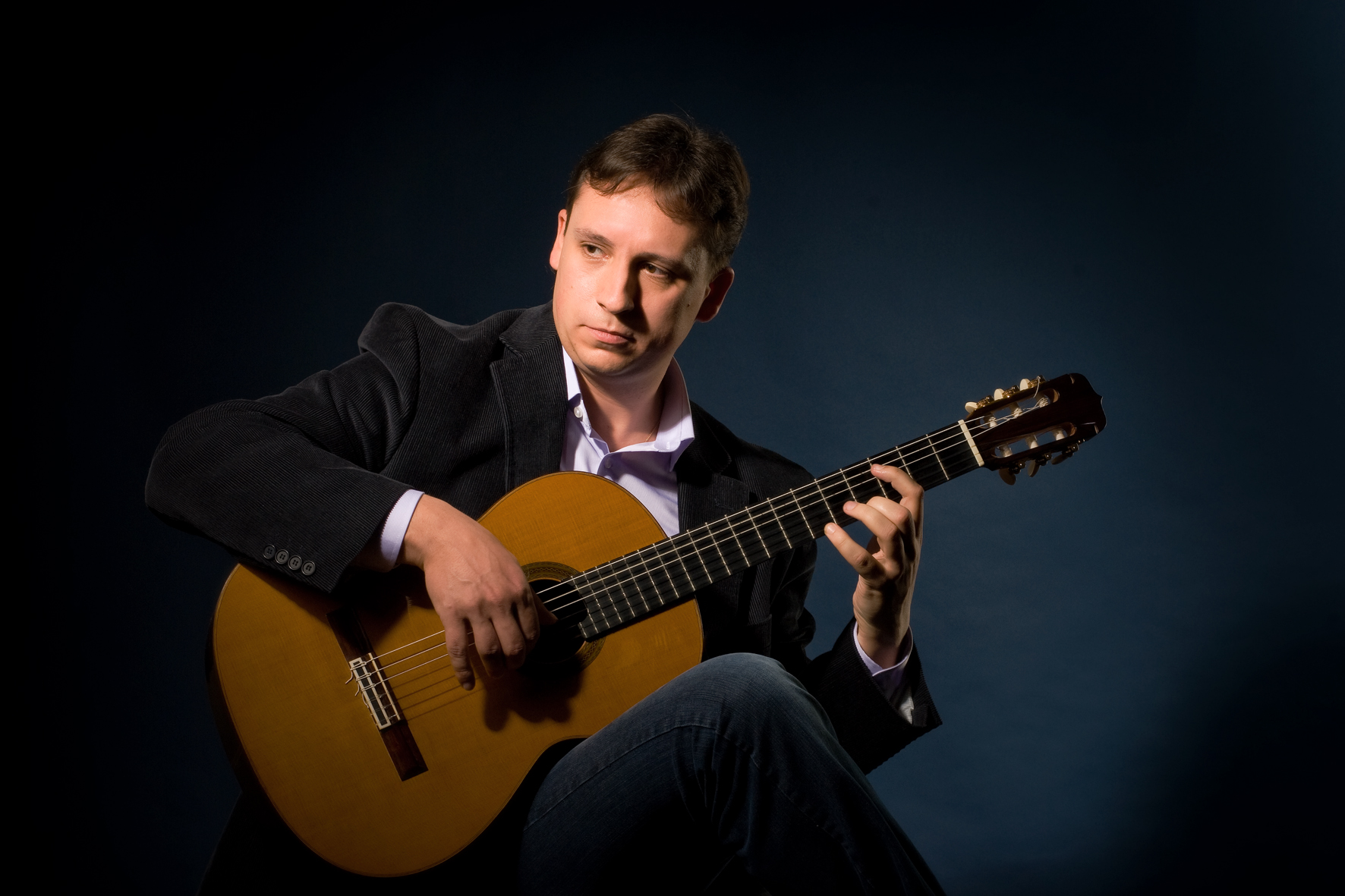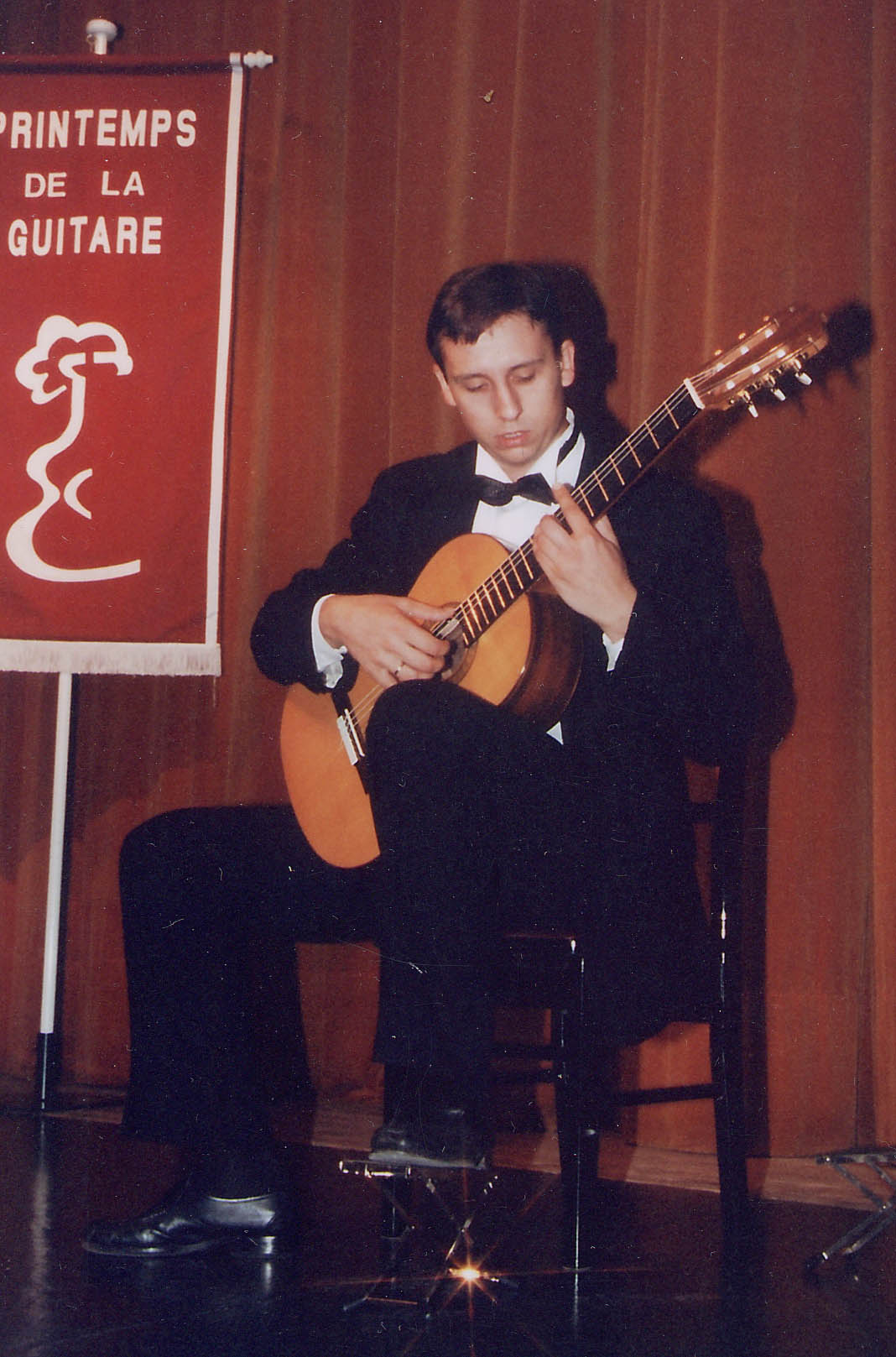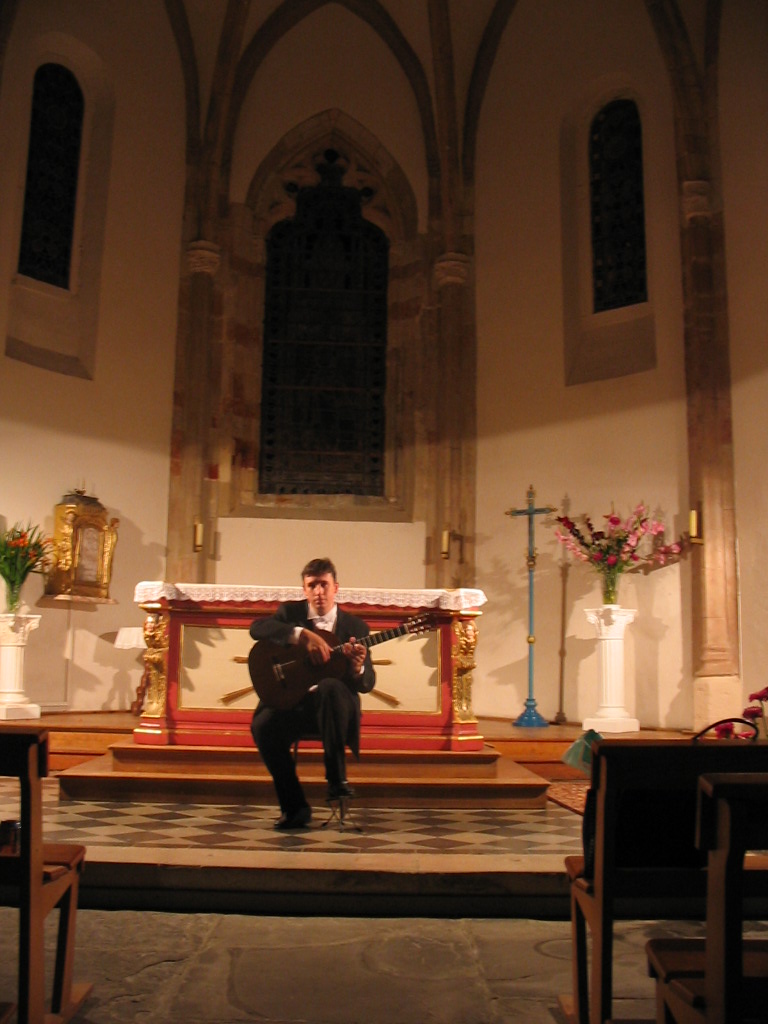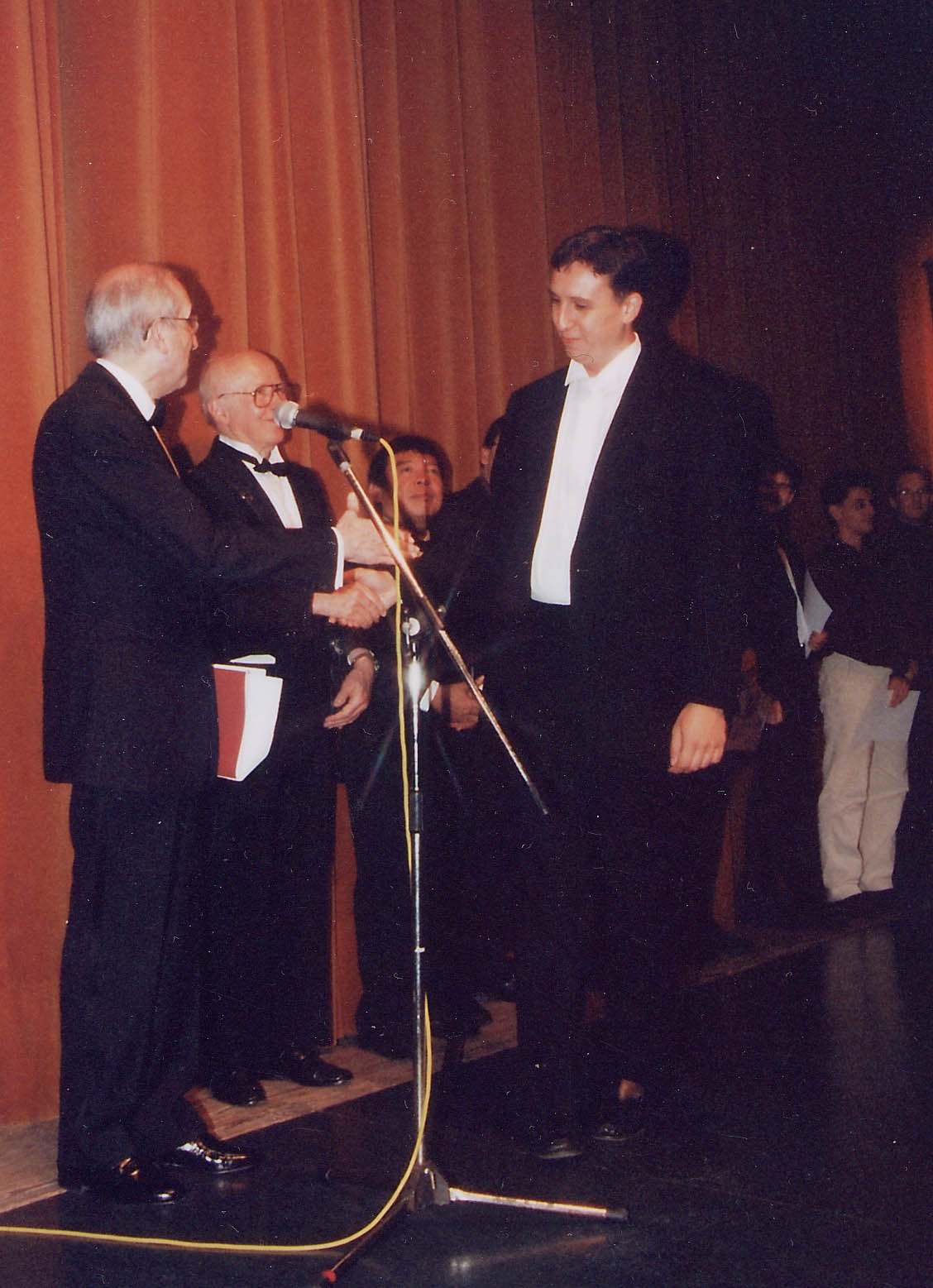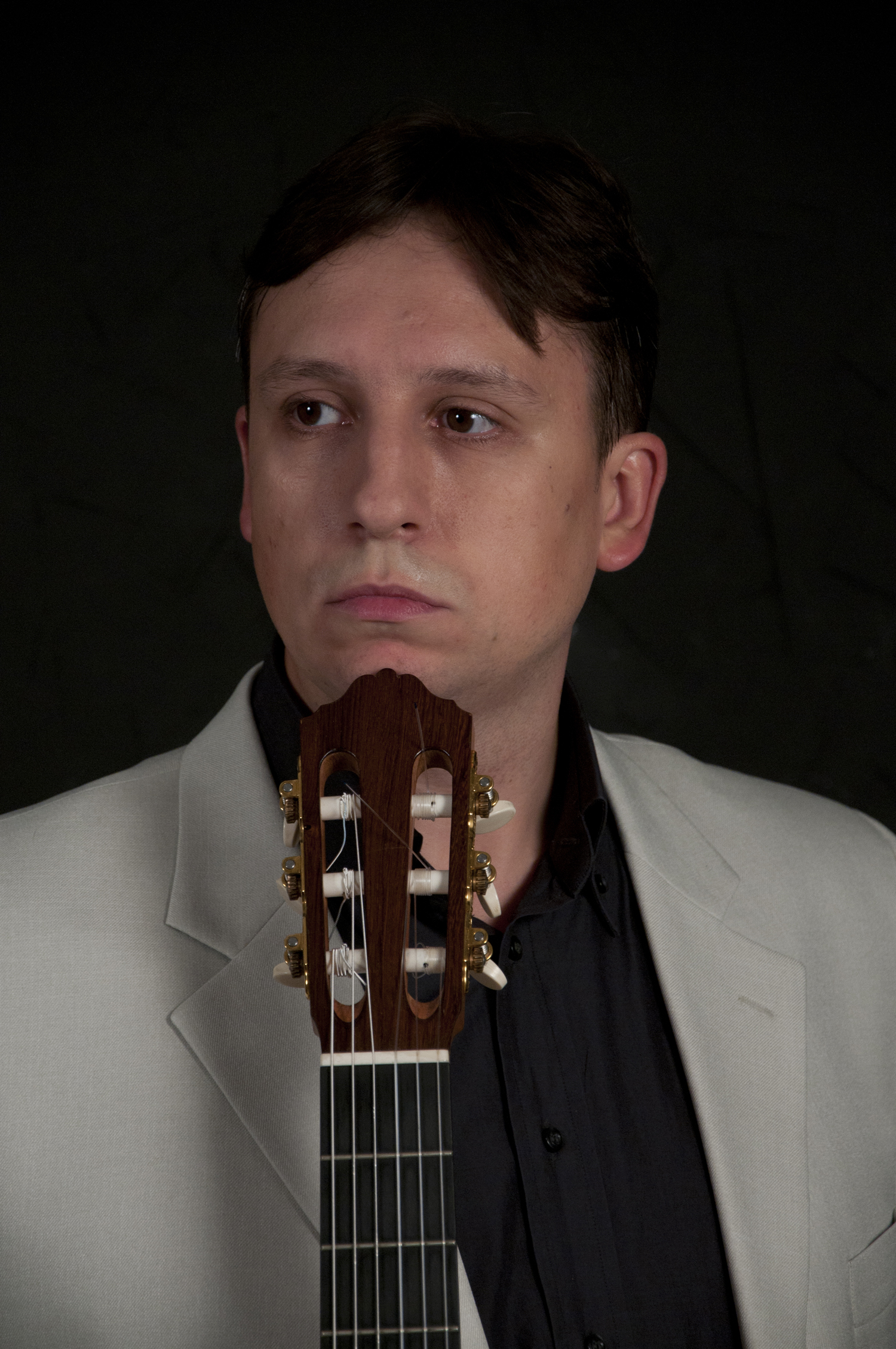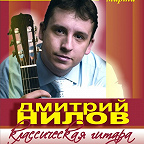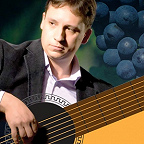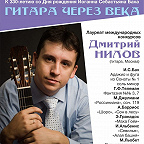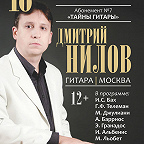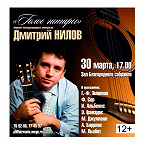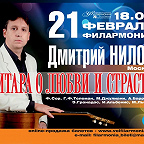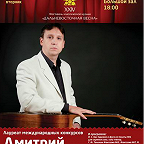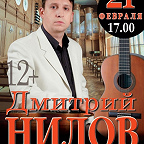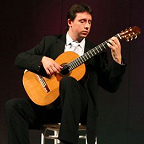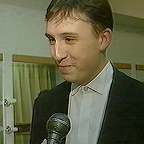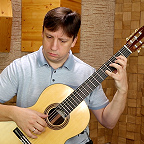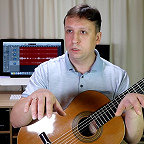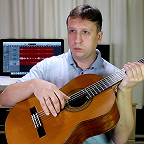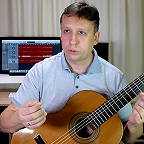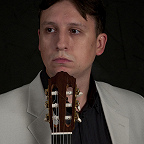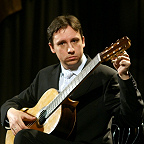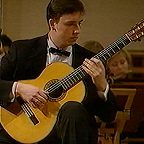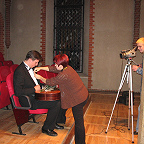Fairness requires us to say that there was no information vacuum in local media in different regions of the Russian Federation. The explanation is simple: Dmitry Nilov most often gave performances there and, by the way, plans to perform there in the near future - this is his niche in the modern guitar community. And on the central TV channels and in the central mass media (including specialized ones) the information about him is really minimal
And there are objective reasons for this.
The fact is that it was important for Dmitry to check the topicality of his groundwork, developing the classical performance traditions of the early and mid- ХХ century directly in the course of active concert activities. In Russia, regional philharmonic halls are best suited for this purpose. These are not formal words: each new work gave (and is giving!) the musician an impulse to try and move ahead using his performance experience to the maximum, to develop his methodical groundwork. And then to check it again through concerts.
At the same time, the festival - competitive concertizing as an important element in the development of guitar art with an emphasis on modern performing principles and artistic creativity of musicians has been widely developing almost all over the world. Here, guitarists also have interesting achievements, including the promotion of guitar in the mass media, on TV and on the Internet.
It seems that in the course of such a creative dispute, the truth can be born. But the consent of the parties is necessary as well as time and, of course, a qualitative and objective information component. First and foremost, it is the point of view of the mass media specializing in issues related to classical guitar.
A concert musician is usually seen on stage. We enjoy the concert without thinking that it's just the top of “the iceberg”. What's hidden in the depths of the ongoing events comes to our consciousness in an extremely shortened form as meaning scraps and flashes of true understanding. This has various reasons: artists don't like and don't want to talk about inner workings, and musicologists don't hurry up with final expert assessments, often preferring historical characters to their contemporaries. Perhaps because historical characters will not be able to argue with them if something goes wrong (not according to their plan).
In this sense, this article is unique. That’s because the personal concert administrator of Dmitry Nilov - Sergey Bykovsky shares his "intimate glimpse" with us. A man, initially having nothing to do with music, had been organizing Dmitry's concerts and went on tours with him almost through all of Russia. Having listened to about a thousand guitar concerts, and not only by the maestro himself, hundreds of times talked to professional classical musicians, he formulated his vision and understanding of both obvious and behind-the-scenes trends in guitar performance.
Sergey has been with Dmitry since 2003: he left his work in the administration of the Smolensk region and followed the musician to Moscow, who had just graduated from the Gnesins Russian Academy of Music.
At that moment the prospect of a professional concert activity of the young guitarist was hardly in evidence, because in Russia Dmitry Nilov was as good as unknown either to philharmonic societies or to the public, or to guitarists. There was a difficult economic situation in the country, young guitarists rarely gave concerts. There were no concert agencies or agents who would organize tours in philharmonic societies - they had to start working on the terms of "private entrepreneurship".
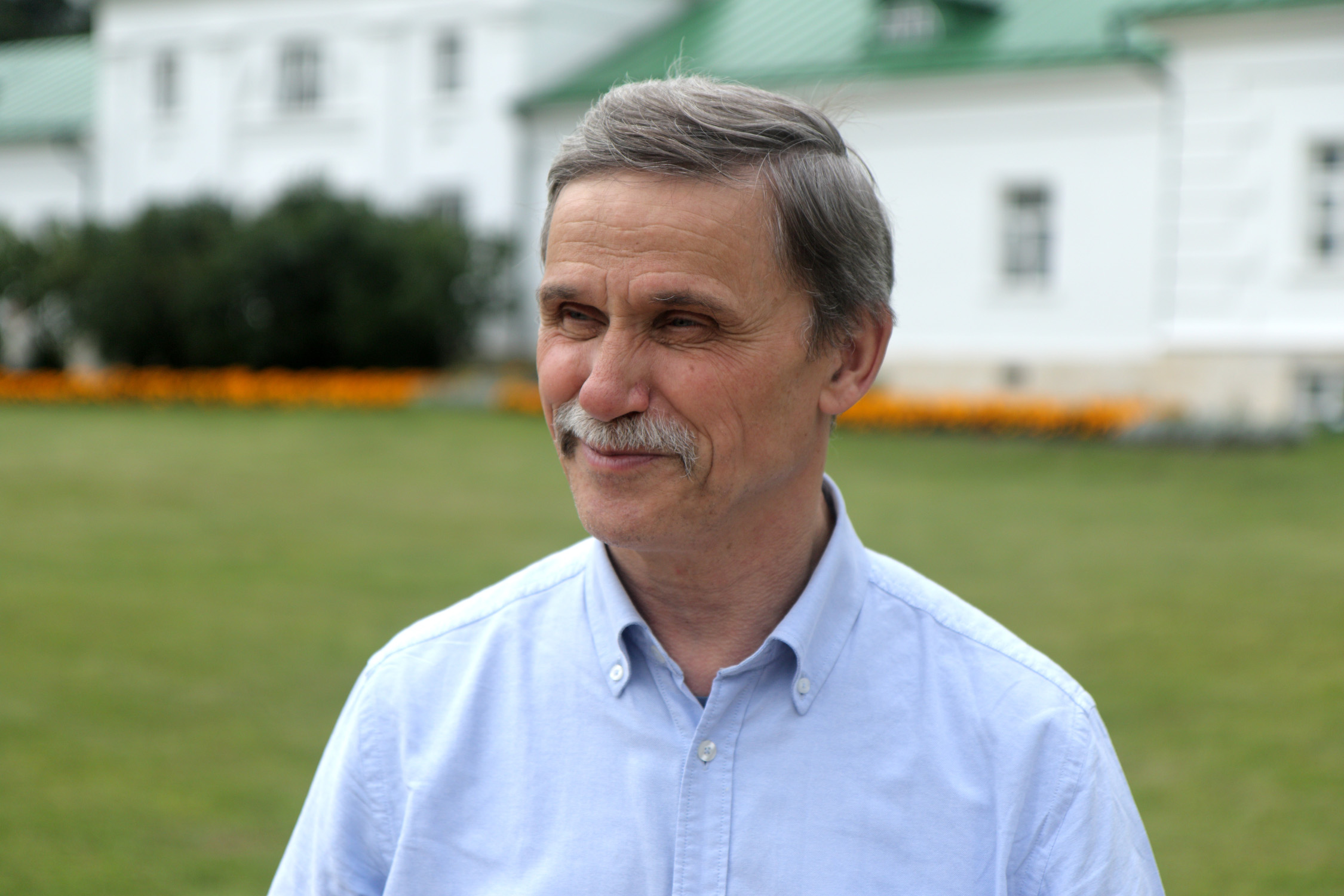 Why wasn't it the musician himself who did it?
Why wasn't it the musician himself who did it?
Sergey Bykovsky is sure that everyone should go about their own business. The business of a performer is to work on music and play. As practice shows, it’s beneficial to both philharmonic societies and artists. The administrator's job is to organize concerts by means of negotiations with the philharmonic society of the Russian Federation and to assist the artist directly in holding them as much as possible.
This is the kind of disposition in which DN entered on the path of the professional performing, where, as time has shown, many surprises had been expecting him.
But we will still begin with an earlier period – because we famously hail from our childhood, and everything that happens to us later, is built into us during a period when our physical and moral qualities are just being formed. As in the sonata-symphonic cycle, the parts of which embody the stages of growth and the individual’s philosophical points of view at these stages: the first part, representing the "man of action" (homo sollicitan), defines the character of the whole work, in the interaction of the parties of exposition, in the development and reprise the main dramaturgical line is laid down; the second part, the reflecting man (homo tantes), switches the recipient into the world of intellectual and contemplative moods, is the search of his way in various life situations; the third part, Homo ludens (the playing man), is the realization of what he has found and the continuation of his search in the concert and performance activity; the fourth part, Homo Publicae (the public man), is the result and a look into the future. Still, the laws of musical dramatic composition explain a lot in the activities of the creative person and the search of his mind.
Homo sollicitan
Esposizione
"The beginning seems to be more than half of the whole"
Aristotle
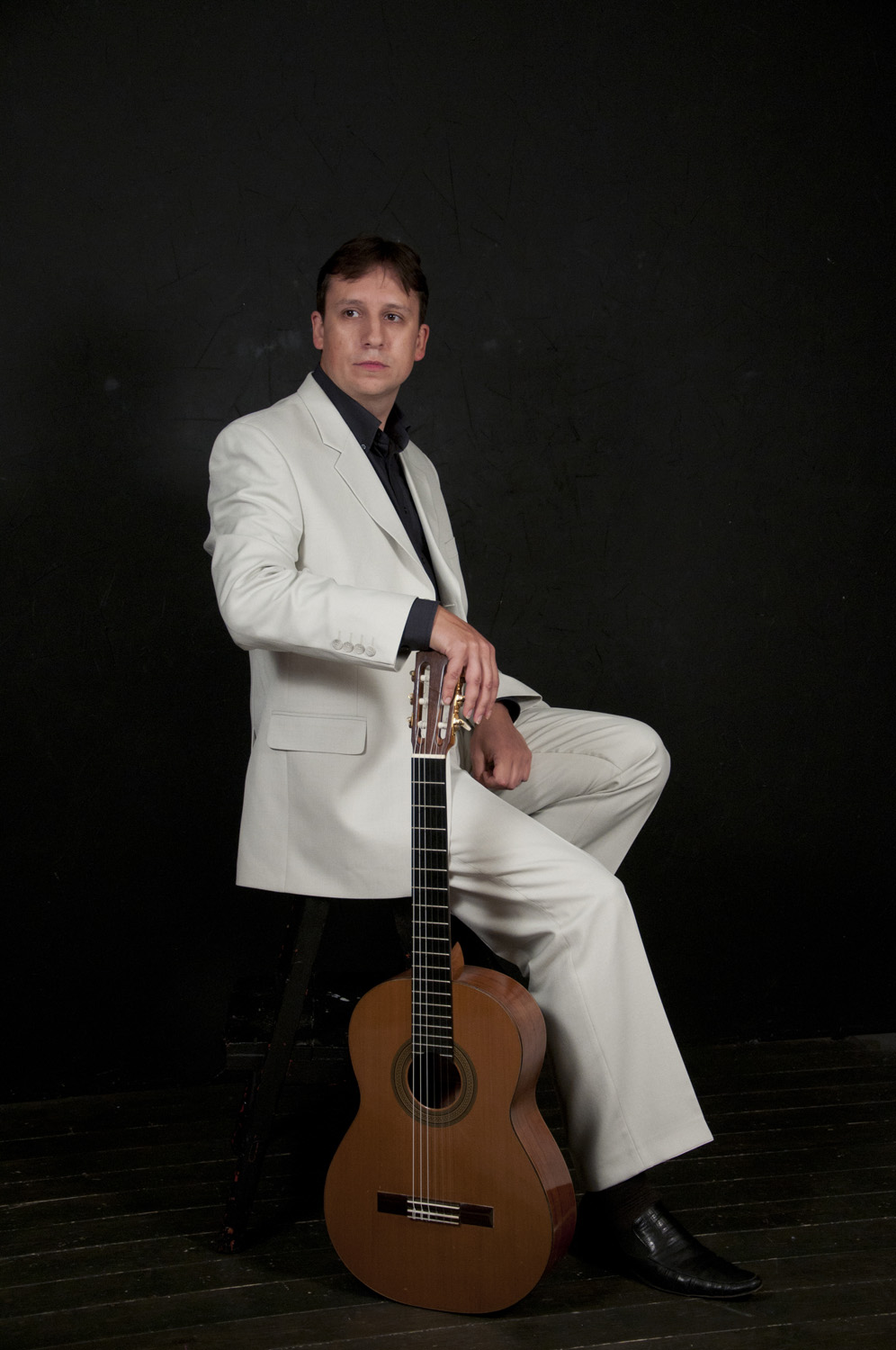 Sergey Bykovsky: In the Nilovs’ house, music had always been heard: recorded or performed by the father - Yuri Nilov, a talented bayan-player, arranger and teacher. Parents gave their priority to academic music. They attended almost all the concerts in Smolensk and used to take along the little Dima, who remembers them almost at the age of two (it was then that he first listened to the play of M. V. Pletnev in the drama theater of his native city). Thus, at the subconscious level, Dmitry developed a "taste" and love for classical music, which was supported by piano lessons from the age of about five, although Dima himself dreamed of violin. Most likely, that's why at the moment of his acquaintance with guitar at the age of 10 he already had a significant foundation for a novice musician and immediately showed interest in the instrument.
Sergey Bykovsky: In the Nilovs’ house, music had always been heard: recorded or performed by the father - Yuri Nilov, a talented bayan-player, arranger and teacher. Parents gave their priority to academic music. They attended almost all the concerts in Smolensk and used to take along the little Dima, who remembers them almost at the age of two (it was then that he first listened to the play of M. V. Pletnev in the drama theater of his native city). Thus, at the subconscious level, Dmitry developed a "taste" and love for classical music, which was supported by piano lessons from the age of about five, although Dima himself dreamed of violin. Most likely, that's why at the moment of his acquaintance with guitar at the age of 10 he already had a significant foundation for a novice musician and immediately showed interest in the instrument.
Now Dmitry believes that it is better to start at the age of seven or eight, but on an instrument that corresponds to the age of the pupil: one could only dream of this in his childhood. But the shortcomings are more than outweighed by learning from the main teacher in his life Severian Anatolievich Soltan (1946 - 1999). About this man, Teacher with a big “T”, we should write some time separately.
Since the times of the USSR, we have had a system of musical academic education that is understandable even to the everyman and which implies at the first stage of the children’s music school a quality education of children in the basics of playing the instrument. At the same time, the system is "tuned" to the fact that children with above-average abilities can go to educational institutions such as central school of music, special school of music, etc. That is, to get to more competent teachers and to follow a special training program for soloists. The guitar’s feature is that it - being actually an independent instrument - was not "built in" into this system then nor is it today, after the lapse of decades. Again, this is a separate topic. But, it seems, that's why the competence of teachers at the very first stage was and still is of great importance for guitarists.
Severian Anatolievich taught at a children's music school of arts, located far from the center of Smolensk where the standard program was attended by very ordinary children. But the teacher had a special charisma. Kindness, professionalism and talent, multiplied by a huge positive internal energy, just "chained" to him students. So Dmitry went to classes from the other side of the city.
The teaching methods for all students in the classroom were based on the classical (by Tárrega) hand positioning, as well as on the work on the muscle freedom of hands (especially the right one), with the obligatory and constant control of the absence of excessive tension. I will repeat myself: with the constant and obligatory control! No one doubted the effectiveness of this approach. All the pupils of the teacher were playing both before and after Dmitry, and many of them were at a fairly high level. Although S. A. Soltan admitted that Dmitry Nilov's abilities in mastering the instrument were downright unique.
 Almost immediately, a very interesting and effective pedagogical "tandem" was formed consisting of two excellent musicians - the father Y. V. Nilov and the Teacher - that never once failed" during the whole period of learning. Surprisingly, they worked in unison, complementing each other at all stages of teaching on various issues. It was thanks to this circumstance that Dmitry developed an understanding of the need to master a special plasticity and accuracy of the finger movements of the right hand, which after a few years led him to recognition at the competition in Belgium (1998). According to the jury and the press, the youngest competition finalist had an amazing and even unique touch.
Almost immediately, a very interesting and effective pedagogical "tandem" was formed consisting of two excellent musicians - the father Y. V. Nilov and the Teacher - that never once failed" during the whole period of learning. Surprisingly, they worked in unison, complementing each other at all stages of teaching on various issues. It was thanks to this circumstance that Dmitry developed an understanding of the need to master a special plasticity and accuracy of the finger movements of the right hand, which after a few years led him to recognition at the competition in Belgium (1998). According to the jury and the press, the youngest competition finalist had an amazing and even unique touch.
And another very interesting detail that characterizes Dmitry at the time. The great teacher L. Auer noted, "There is one more quality that is necessary for a promising student. This is what the French call "l'esprit de son metier" (“the spirit of craft”): a professional's love for all the details of his art. He must have an intuitive, instinctive ability to seize all the technical subtleties, to perceive all the shades of musical thought“.
Dmitry probably didn't know that phrase at the time. But he was literally "saturated" with this very "spirit of craft". There was a feeling that for him as a pupil of a children's music school, there were simply no trifles that he was not interested in and that he could neglect, whether it was mastering technical methods or their application in the music being performed. In practice, it was "coupled" to a permanent, amazing in its quality work in the conditions of the highest level of personal discipline on the link "sound - hearing". Again, it was an inner need of Dmitry himself. That must have been the source of his possession of this very "intuitive, instinctive ability to seize all the technical subtleties, to perceive all the shades of musical thought“ in the concert future. I'm talking about this because when Dmitry started to give concerts, this quote was often referred to by musicians, explaining the nature of his performing talent. And Dmitry's statement - "For me, academism is a question of personal performance discipline" - also has its roots in this "childhood" attitude to the "trifles".
But, as life has shown, the system of guitar mastering as an academic instrument, even with such a teacher as S. A. Soltan, can’t be, however, recognized as the ideal one. There were problems, and they were serious. Although, the awareness of the nature of this phenomenon came much later, only in the early 2000s.
And one more thing. Confidential relations between Dmitry, his teacher and his father were already then very helpful to the young man in the professional sense. Namely, in understanding that the victories themselves at competitions, either now, or in the future (moreover, their quantity), do not influence in any way the receiving of recognition from the academic musical community on so-called "Hamburg account". Only a high level of performance, demonstrated on the concert stage and in comparison with the best examples of instrumental academic art, can have significance.
Nevertheless, Dmitry's victories at Russian competitions (at that time there were only "state" competitions) came very early. His success is noticed: a little later, the very young musician and the student of music school becomes a scholarship holder of the Russian Federation government awards in the field of musical culture. And this is despite the fact that he and his parents had no "star" plans for his musical future. They treated guitar and its place in the music world adequately.
About the prospects in the performing career of Dmitry Severian Anatolievich said in the mid-90's: "Dima belongs to the category of musicians led through life not by career aspirations, but by the fate that will largely be determined by his deeply personal attitude to the guitar and the music in general”. The teacher already then understood that at the first place for Dmitry Nilov would always be only the music, and more precisely, the level of its performance. And that in the future he wouldn’t agree to any compromises, first of all, with himself.
Life confirmed it. I am convinced that if Dmitriy did not have the recognition of the academic community as a concert performer, he would not have "lingered" on stage: he simply would not have wanted to go out there himself.
Disegno
Sergey Bykovsky: As noted in the previous article about Dmitry, exactly the year 2000 was a turning point in his creative life.
The musician already had a reputation, he was not just a laureate of one of the most prestigious competitions in the world – he already had “under his belt" a very flattering in professional terms evaluation of the concert prospects by the jury.
However, Dmitry's personal dissatisfaction with his creative results, especially the sound, is characteristic of him.
Yes, he feels flattered that his sound aesthetics are being compared with the aesthetics of J. Williams as well as A. Segovia, but with all due respect for the personalities of these guitarists, Dmitry wanted more.
Frankly speaking, it was not clear what he wanted to find in the sound, what to achieve? And he himself must have only intuitively imagined the "subject" of his search.
The musician analyzed the experience of almost all famous concert guitarists in the most thorough way and with deep respect. It never occurred to him to consider their performing as something outdated or imperfect because of their hand positioning. He built on them in search of his sound, but, alas, he couldn't find answers or at least decide on the line of work… He didn’t dissemble it.
Frankly speaking, I didn't meet such attitude of guitarists to the sound either then or now. Modern young laureates of prestigious contests are absolutely convinced that everything is fine with them. It's great when the performer is self-confident, but it would be nice to think, why do guitarists notice the fall of interest to their concerts in recent years? Maybe it's not just the repertoire problems, guitar design and the stagnation of critics, as many people think
Maybe Maestro Bream isn’t wrong, since long time speaking out actively against guitar festivals, in which he never participated, as he saw in them a creative guitar "ghetto", a kind of niche, where the guitarists, playing for each other, escape from the solution to the problem of compliance with the requirements of academic performing, retreat into "their" purely guitar playing preferences? Maybe it makes sense to be more critical of themselves as musicians seeking to change the academic community’s attitude to the guitar? Dmitry's experience, I'm sure, can be very useful for that.
Ripresa
Sergey Bykovsky: I have to admit that firstly I was skeptical about Dmitry's professional concert activity (as well as any other classical guitarist). It seemed to me that Dmitry would devote one or two seasons to concert activities and then would start teaching. The purpose of the concerts in those couple of seasons was to expand Dmitry's "recognizability" as much as possible in order to spark the interest of potential students. That is, everything according to the scheme which was standard for guitarists. Well, and I would continue to do my main job. And there were reasons for such plans.
At the beginning of the XXI century I had an opportunity to consult specialists in the regions of Russia on the prospects of professional concerts for classical guitarists. Conclusions were pessimistic: the audience of the classical guitar became more and more "of its own", guitar-related (students, their parents etc.). The "novelty" effect of the classical guitar of the 60-80’s has passed, active interest to it on the part of the usual fans of classical music has decreased. On top of all, the difficult financial situation in the country which caused a decrease in concert attending as a whole. Therefore, the professional concert activity of guitarists was considered almost unrealistic. As the most relevant and promising directions were considered teaching and performing participation in festival-competition projects.
Dmitry changed all my "plans". I had to quit my main job and learn literally on the run the basics of a new type of activity - that of a concert director.
Homo tantes
Upstream...
"Try not to become a man of success, but rather try to become a man of value" Albert Einstein
Sergey Bykovsky: As far back as approximately in the middle of the year 2000 I asked Dmitry a question which had come up after visiting guitar concerts and studying the latest trends in guitar performance. The question concerned the positioning of the right hand and consisted in the following: why not try to play with this very modern positioning of the right hand, if he is not satisfied with his own sound?
I grounded it on the fact that it is taught in this way almost all over the world, and this is how almost all the most famous young guitarists play. My visits to the concerts of musicians playing in this way showed that the public perceived them positively and even emotionally. Especially in case of a talented performance with good taste (lyricism, "intimacy" of guitar sound had been always appreciated) of the selected repertoire. Though there were some questions also to them, but it seemed to me that Dmitry was missing something very promising.
Dmitry Nilov's answer is unambiguous: he wants and will play only in his own way.
His arguments: "The fact that the sound doesn't suit me doesn’t mean that I think it's bad. I occasionally use the modern positioning, but only if it is dictated by music. For me, this is one of the right hand positions that can be used selectively and briefly. As for the fact that "everybody" sticks to the "modern positioning": after the competition of 1998 in Belgium, the members of the jury, who have great authority and world fame, not only congratulated me on my success, but also expressed their support for my playing with the classical positioning of the right hand. And another thing: Timophey Tkach, who besides guitars works with violins and other bow instruments, is making a new instrument for me. So he and the violinists as well as the cellists who are visiting his studio unequivocally recommend the use of the "classical" positioning, because it is based on the most important thing - the freedom of wrist and hand. In principle, they don't have to know anything about guitar, but they have a wealth experience with hand-positioning. Especially when it comes to conservative attitudes towards sound extraction and technique“.
The latter was especially important and convincing for Dmitry, but I still had a hope that he would change his principles and play with the modern positioning.
After all, there was practically no dispute in the guitar community regarding the use of classical or modern placement of the right hand - neither abroad nor in Russia. There was a general and absolute certainty that the "classical" positioning was a completely detail of the expiring stage in guitar performance. And already the nearest future would show and prove the advantage of transition to modern tendencies in technique.
That's how the situation in 2000 is "silhouetted" and becoming more and more specific: among his peers Dmitry becomes almost the only one who plays with the classical position of the right hand.
The following years which were connected with Timophey Tkach's workshop turned out to be very interesting due to the nature and level of communication of the musicians. It was there that Dmitry met professor of the Moscow State Conservatory, the Gnessins Russian Academy of Music, a violinist Koshvanetz Alexey. This was something that Dmitry had been missing all previous years - a professional view from one of the best representatives of the world academic violin school. There was no talk of how to play the guitar. Only a "demonstration" of the performing level and a suggestion to the guitarist to penetrate by himself and take into account the principles of sound extraction technique of violinists when working with his instrument.
The intercourse gave Dmitry a positive creative power for further independent work, he became much more confident, it was felt that he, as they say, "knows what he is doing". Although questions continued to arise.
For example, Dmitry always paid attention to exercises. But from the middle of 2000 his relatives noticed that the volume and level of work on them had increased significantly. They asked what it was related to: there are studies at the Academy, and here there are exercises - as if at college before technical tests, but only in a larger volume. Dmitry was never inclined to philosophize and reflect on the issues of the theory of performance and educational process. He answered that he needed it that way.
And only a few years later, after taking up his active concert activities, the situation began to "clear up". However, some external factors came into the picture. During the concerts I was often approached by the heads of the philharmonic societies who were present in the hall with the question “Where did Dmitry Nilov learn this?” Then we used to talk about the amazing "work" of his hands. The information about A. Frauchy and the unique touch was accepted, but did not satisfy. But when it was announced that Dmitry had been consulting a violinist, a professor at the Moscow Conservatoire for more than 3 years, as response would came back something like this: “everything is clear now!”. Among those interested there were more frequently former and active violinists, violists and cellists. Naturally, I tried to clarify what was going on. But Dmitry believed that he did not do anything new (the same old Pujol’s School was still "working"), he was just taking responsibly the lessons on the instrument.
I am sure that it is up to specialists to analyze and draw conclusions on the methodological issues of performing by DN. I can afford to pay attention only to some details.
So, in order to communicate with a world-class violinist in an "understandable" musical language, only a classical positioning of the right hand is obviously not enough. It is necessary to achieve another level of smoothness and evenness of sound. The problem, by the way, is not new. In this regard, there is an interesting clarification by the well-known in Russia and Europe in the XIX century German pianist and composer B. Damcke that "even in the hands of a brilliant virtuoso (he meant N. Paganini whose play on guitar B. D. personally listened to), a smooth playing on guitar is impossible, and therefore, it is unable to be truly musically processed. As a result, according to Damcke, this is what "justifies the neglect in which this instrument is left behind". In the light of these statements, it becomes clear how difficult the task set by Dmitry Nilov was.
For him it was a question of ensuring the maximum duration of each note. Not only did observations over the violinists help, but also the groundwork of the famous guitarist Arkady Ivannikov. Dmitry decided that it was necessary to shift the emphasis from the development of finger motor skills (but not to reduce or even refuse it!) to the practicing of the precision in movements and tactile contact of fingers with strings. And there came an understanding of importance of the left hand technique. He began to pay a lot and even a great deal of attention to it.
For example, an active use of turning the left hand towards the little finger. It is mentioned in his videos as if in between, but in fact it is a question as good as of the violin positioning of the left hand! But for this purpose it was necessary to start placing it on a new way at the age of 22 (violinists, by the way, have been doing it since childhood). Or performance of the exercises for the left hand fingers with the thumb removed from the guitar fretboard - it’s beautiful, difficult, even dangerous. But in both cases, no doubt, the game was worth the candle.
As a result of such work, which, by the way, has been going on until now, the sound of each note gets the maximum duration. And the musician has achieved the possibility of maximum use of the entire "resource" of classical placement of the right hand.
You should watch training videos by DN both with exercises and with the analysis of their application. There is something to think about.
Of course, such work would be impossible without a general high technical base, laid down by his teachers in childhood and adolescence.
And I can't help but touch upon a very interesting moment which refers, however, to a later period, the middle of 2009. Once we were talking about the importance of the years 2000 – 2002 in his life, and Dmitry said something like the following: since then I have been engaged in "beating dilettantism out of myself". And all he does when working on each new work, one way or another, about 60-70 percent is connected with overcoming this very dilettantism.
I ask you to reflect on it. First of all, of course, it is self-criticism, which I considered at first absolutely needless. But having penetrated deeper into the problematics of the topic, I had to admit: this point of view of Dmitry is not only relevant for guitarists, but also can grow to an interesting topic when thinking about the ways of development of the guitar performing art.
Homo ludens
Concerts. New guitar sounding
"Anton Rubinstein was once asked if and how he could explain the extraordinary impression his play made on the audience. He answered approximately this: it's probably partly due to the very high power (capacity) of sound, but mainly to the fact that I spent a lot of effort to achieve singing on piano.”
А. Rubinstein (cited by H. Neuhaus)
Sergey Bykovsky: During the second half of 2002 I had been conducting "research" in more than 10 regions of the Russian Federation, trying to find out what should be considered when organizing concerts of a beginning classical guitarist. The questions had been addressed to teachers and specialists of philharmonic societies.
The most popular were recommendations as follows:
- concert programs should contain a selection of classical guitar works, and between them the works of modern composers have to be inserted in order to fight against the sound monotony;
- every 10-15 minutes you have to converse with the public about widely different topics. The aim is similar to the previous clause;
- it is essential that the concert be conducted by the artist himself. The aim is to contact the public in support of the fight against the same notorious monotony.
Frankly speaking, I was surprised by the frequency of mentioning the problem of "monotony". Why, I was initially sure that the recommendations given in the second and third paragraphs are related to the additional artistic impact of the musician on the public, in order to create a "home" environment in the concert hall.
I told Dmitry about the results achieved.
He agreed to include in the program the works of modern authors L. Brouwer and N. Koshkin in the program, but he flatly refused to conduct his concerts or to talk to the audience from the stage. I couldn't make him change his mind, although I tried. But I hoped that the situation would change in the future, progressively with new concerts. Because, according to my observations, it "worked out" very well with guitarists. As it turned out later, it was in vain.
By the way, at that moment Dmitry already had, albeit not very active, concert experience in philharmonic societies. At the end of 2002 - beginning of 2003 he participated as a member in the quartet of Moscow guitarists in several projects of big Russian cities. These were programs with symphonic philharmonic orchestras of Moscow, Yekaterinburg, Saratov, Kazan and Volgograd. In addition, the Moscow Philharmonic invited Dmitry to perform in the final concert of the festival "Russian Winter" in the program "Stars of the XXI century", along with such famous musicians as Denis Matsuev and Igor Fedorov.
Thus, there was nothing "unusual" for Dmitry in the fact of walking onstage at philharmonics. But when by the end of winter 2003 he was offered a schedule of solo concerts, I immediately noticed that there was some special determination in Dmitry's words and his behavior. I thought that he probably had a "working" level of responsibility, quite predictable in such case. But... it wasn't just that.
I remember Dmitry's first professional solo concert which took place in early spring 2003 at the Veliky Novgorod Philharmonic. From the very beginning, I understood that Dmitry played almost the same works that I had heard him perform not so long ago, but they sounded completely different. And not in separate fragments, but different in general. And the program comes over absolutely in a new way! I even thought that maybe it was due to his modern right hand placement that was "working"? I observed on purpose. No - there were no changes - "classical".
The audience reacted emotionally restrained, but with some particular respect for the young musician. She applauded very "densely". The concert came out beautifully. The first pancake was not spoiled.
Then I still formulated for myself my impression of that performance. The music sounded much more “powerful” and, most importantly, more “serious” than before. The first thing that came to my mind as an administrator in this connection: due to its "seriousness", such performance actually "gives up" on the wide interest of the public, and therefore, of the philharmonics in Dmitry Nilov. After all, I knew that the guitar was successful on the stage, first of all, as an instrument of exceptional lyricism, and the prospects for such a performance style seemed to me more than doubtful.
What was my surprise when it quickly became clear: my assessment of the situation was absolutely wrong. From the very first performances Dmitry aroused great interest of Russia’s philharmonic community represented by directors, creative managers and experts. And this expert system of musician's evaluation was much more effective for Dmitry Nilov’s promoting than, for instance, providing the philharmonic societies with his audio and video clips. Even the best recordings do not fully convey the features of his sound palette...
I can say for sure that as a concert musician Dmitry Nilov was "born" on the stage of the philharmonics and only thanks to the philharmonic community of Russia. Hundreds of concerts by Dmitry, including those in the most prestigious halls, would not have taken place without collective interest and attention. The philharmonics immediately believed that they needed such a guitarist and that he had both serious creative arguments and prospects.
This is confirmed by his participation in the programs of the Moscow Academic Philharmonic with performances in the Great Hall of the Moscow Conservatory and in the Tchaikovsky Concert Hall and the fact that since 2003 Dmitry Nilov has been playing 50-60 solo concerts per season. I would like to emphasize that most of them were organized on the initiative of philharmonics.
What could be the reason for the increased attention of the philharmonic community and the desire to support the novice, then little-known musician? Frankly speaking, there were no philanthropists among philharmonic leaders. As a rule, they were strict in their assessments, but very competent managers with a "creative bent". They couldn’t be surprised by technical perfection, virtuosity, lyrical beauty of guitar sound.
They were very well up to speed on "guitar affairs", as many of them were interested in this instrument and had personally listened not only to the elite of Russian guitarists, starting with A. M. Ivanov - Kramskoy, but also the most famous foreigners who had been touring the USSR since 60-70th years of XX century (John Williams, duo of Ida Presti and Alexander Lagoya, Narciso Yepes, Alirio Diaz, Maria Luisa Anido etc.).
It’s a relevant question: by what did the 25 year old Dmitry Nilov stand out against the background of such eminent musicians?
Again, it is the prerogative of professional theorists, including musicologists, to answer this question. There are a lot of things that can and should be taken up. But, for lack of such researches, I will take on this function and make only some conclusions which are essential from my point of view, having generalized points of view of different people after hundreds performances by Dmitry Nilov in tens philharmonic societies.
From the very beginning of his professional concerts Dmitry drastically expanded the aesthetic boundaries of the concert sound of guitar, abandoning the emphasis on lyricism, intimacy and warmth in favor of the implementation of drama, embedded in the music, but at a qualitatively different aesthetic level.
None of the representatives of the philharmonic community could find analogues to this even among the most notable guitarists. Impressive was not the very fact that the DN’s instrument was "singing" - this virtue of guitar has been known for a long time. But to achieve a dramatic singing or even recitation which are characterized by a timbre - dynamic saturation of the sound in combination with its volume, in the conditions of a concert hall is a very challenging task. But exactly this was Dmitry’s distinctive feature and hallmark and put him on a different level compared to other guitarists.
Later, changing from guitar repertoire to programs consisting of adaptations of piano, vocal and then violin music, Dmitry Nilov demonstrated each time completely new possibilities of guitar as a concert instrument. His play acquires its special individual feature - masculinity, courageous lyricism.
Frequent feedback of experts on Dmitry's concerts sounded like this: "I've listened to guitarists... I've been told how Dmitry Nilov plays, but I didn't believe it. Now, after his concert, I believe it. He really has everything in his play: amazing for guitar smoothness and evenness of sound, expressiveness (especially, due to the perfect level of sound application from the lowest to the highest frequencies), incredible mastery of the variety of timbres and dynamic range of guitar (from "pp" to "ff"), which allows to create extensional musical pictures and saturated sound space in the concert hall. As a rule, the applauding audience in the hall doesn’t even realize that they are present at a unique event. They are sure that the music cannot sound different. Why? Because Dmitry Nilov’s art is phenomenal in its absolute naturalness and simplicity...”.
Such feedback or something similar I've heard not one or two times, but dozens of times. And it was pronounced by competent people, respected in the world of music. Indeed, it was a very important support for Dmitry personally and as an element of effective promotion of him as a performer, multiplying the number of those who would like to attend the concerts of the young guitarist. I can say that for sure, because in the cities where he has performed several times with minimal advertising, there has always been audience. Speaking of the audience. Not all the halls were filled with "exquisite" intellectuals. For example, in the mountains at the border of France and Spain, playing in Templars’ temples and castles of IX-XII centuries, Dmitry Nilov admired ordinary peasants through his academic manner and was given a standing ovation. His performance magically affected ordinary workers, employees, military - from soldiers to generals, scientists, Olympic champions, artists, ministers, businessmen and many others. In the meanwhile, when making up programs, the maestro never plays up to the tastes of unprepared audience. Dmitry and his music have an amazing ability to increase the audience's sense of self-esteem.
The philharmonic community was confident that Dmitry Nilov would have his own audience. They noted that his concerts were very attractive for fans of piano, violin and other classical instruments. This situation was of interest to philharmonic societies and VERY useful for them in terms of development of guitar concerts. After all, it is a great opportunity to attract additional audience to the concerts of ALL guitarists due to a healthy creative competition.
By the way, when Dmitry was just starting to perform, there was a tendency to cancel guitar subscriptions. And not without the influence of his concerts their number in the middle of the 2000’s began to grow dramatically. I can speak about it confidently, because I know the situation of that time "straight from the source". As they said in the philharmonic societies, one Nilov's concert every two years was enough to ensure the interest in guitar subscriptions. People would actively compare who they like more - there are reasons for that.
No one ever thought that now all guitarists should play only "like Nilov". Not at all. The main thing is that they should play well. Lyrical guitar sound is always attractive also in the style of A. Segovia, P. Romero as well as in the style of D. Russell, M. Barrueco.
Dmitry's performance was considered as a development of drama in the spirit of the "English school" of J. Williams. Although, from my point of view, this is still a "mix" of styles of J.W. and Andreas Segovia.
Especially often, in philharmonics attention was paid not only to the outstanding abilities of Dmitry Nilov, but also to the fact that a Methodic was clearly discernible in his results. And, moreover, it was an implemented methodic, i.e. "field-proven", available for empirical research and therefore interesting for guitarists and teachers of all levels. That in turn can allow guitarists due to the convergence of different performing styles to raise to a new height both the teaching school of guitar playing and (which is of special importance!) the average level of guitar performing.
Drama in music and professional life
"Drama is a characteristic of the degree of personal relevance..."
Alexey Losev
Sergey Bykovsky: As I have already mentioned, a special embodiment by Dmitry Nilov of drama in music gave his performance an exceptional individuality. Unfortunately, by the end of the first decade of the 21st century, the drama in music had somehow passed into the professional life of the musician himself.
Already after the first concerts, musicians of various levels visited Dmitry in his artists’ room, starting with People’s artists, who usually gave their highest assessment of Dmitry's skills, and ending with ordinary guitar teachers or students who heard this assessment.
At the same time, almost always the conversation concerned the positioning of right hand, and Dmitry explained the advantages that the use of its "classical" version gives to all guitarists. He believed that the question of choosing one or another position for concert guitarists is about the personal preferences of each. But it is still necessary to teach to play starting from the children's music school and to evaluate the level of performance at competitions from the position of "classical" positioning of right hand.
Many learners and students after such a conversation must have had doubts about the objectivity and competence of the statement that the classical placement of right hand is a hopeless past of the guitar. And more and more often the question was asked which Dmitry could not answer - "Why aren't we taught to play like this (with classical positioning)?”.
It is quite possible that they posed these questions not only to Dmitry, but also to their teachers.
But they couldn't answer them either, as approximately since 2002 in the Russian Federation solely the modern placement of right hand has been actively promoted in the guitarist educational process: it is stated in the published manuals, presented at master classes by the most famous foreign and Russian guitarists-pedagogues of the largest universities of the country. This is postulated by the official recommendations in the methodical documents of the Russian Federation’s Ministry of Cultural Affairs for the children's music schools and music colleges (2002 and 2004).
Meanwhile, modern tendencies aren’t a Russian know-how at all, but they are a global trend. Behind it there are interests and authority of the most prominent representatives of guitar schools almost all over the world. But, as the saying goes, "You shall make you no idols": Dmitry still believed that he had the right and even the obligation to defend his point of view on the concert stage, and at the time being also by his methodological work.
Coda
So, the balance of power at the moment is as follows: on the one hand there are guitar communities of Europe, America, Asia, including Russia, defending the evolution of guitar art on the basis of "modern" trends in performing technique with the rejection of "classical" traditions; on the other hand there is Dmitry Nilov, asserting that the development of guitar can and should be based on the classical principles of Pujol’s School and those of guitarists of the early and mid-twentieth century (Tárrega, Llobet, Segovia, Williams), but taking into account the achievements of the academic string school.
Is this opposition an exaggeration? Not at all! Anyway, such a consecutive assertion by a top-guitarist of "classical" principles of performing techniques is for today without equal in the history.
What's next? Sergey Bykovsky is sure that the conflict in the professional guitar community of such level and duration is extremely harmful not only for the artist, but also for the entire guitar community in Russia, because it leads to infringement of common interests at present and in the future.
According to the theory of conflicts, the best possible way out of such situations is a compromise in search of an acceptable solution to the problem. The question is how to achieve it. There are only few options, but they do exist. And this is, first of all, a huge responsibility of specialized universities and, especially, their guitar teachers. After all, they aren’t just teaching - their work should be the highest point of development of guitar methodical thought, and the results should confirm its correctness and relevance. This is the responsibility not only to those who study, but also to the guitar - the responsibility for its worthy place among academic instruments. In this situation, not everything can be decided by such an argument as the number of winners at the GFA Competition.
And the channel of Dmitry Nilov's Creative Workshop on YouTube continues to actively gain subscribers and viewers, being one of the leaders among the channels specializing in various technical and performing issues of classical guitar. And this is despite the fact that he does not have any financial support in the promotion. Whereas the dynamics of viewings was at first growing mainly due to the USA, Europe and Asia, then since the middle of the last year Russia started to "catch up" actively. Information about Dmitry Nilov is spreading across all continents. In anticipation of further turns of this story, we will have "a finger on the pulse".
This means, to be continued...
P.S.
Sergey Bykovsky: It is impossible to "embrace the boundless" - only this explains the absence of a story about Dmitry Nilov's studies at the college and the Academy, although Dmitry treats with deep respect his teachers V.F. Pavlyuchenkov and A.K. Frauchi. Only to touch slightly upon this period would be wrong. But its more detailed analysis is a too serious task. I am grateful to the journalists of the newspaper for the approach they chose to discuss the material.
Writer: Shubenko Natalia
Поделиться:


